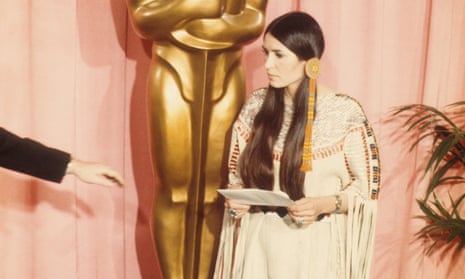The Academy of Motion Picture Arts and Sciences (Ampas), the body that oversees the Oscars, has issued a formal apology to Sacheen Littlefeather, the Native American activist who appeared at the 1973 Academy Awards ceremony as part of Marlon Brando’s refusal to accept his award.
Brando was awarded the best actor Oscar for his role as Vito Corleone in The Godfather, but did not attend as a protest in support of Native American rights, in part inspired by the ongoing two-month occupation of the site of the 1890 Wounded Knee massacre by the American Indian Movement (AIM). Instead, Littlefeather declined to accept the statuette from presenters Roger Moore and Liv Ullmann, and made a short speech, in which she said that Brando’s stance was due to “the treatment of American Indians today by the film industry ... and on television, in movie reruns, and also with recent happenings at Wounded Knee.”
The speech was greeted with jeers from the audience, and Littlefeather, then 26, later reported that actor John Wayne had to be restrained by security guards backstage from assaulting her, while other individuals backstage made offensive gestures.
Ampas has issued a statement of reconciliation signed by its former president David Rubin that described her appearance as “a powerful statement that continues to remind us of the necessity of respect and the importance of human dignity”.
“The abuse you endured because of this statement was unwarranted and unjustified. The emotional burden you have lived through and the cost to your own career in our industry are irreparable. For too long the courage you showed has been unacknowledged. For this, we offer both our deepest apologies and our sincere admiration.” The organisation has also planned an evening of “conversation, reflection, healing, and celebration”, including an appearance by Littlefeather with Bird Runningwater, co-chair of the Academy’s Indigenous Alliance.
Littlefeather, now 75, responded by saying: “Regarding the Academy’s apology to me, we Indians are very patient people – it’s only been 50 years! We need to keep our sense of humour about this at all times. It’s our method of survival.”
“I never thought I’d live to see the day,” she added. This is a dream come true. It is profoundly heartening to see how much has changed since I did not accept the Academy Award 50 years ago.”
The Wounded Knee occupation started in February 1973, and was a highly publicised protest by a 200-strong group of Oglala Lakota and members of AIM on the Pine Ridge Indian Reservation, on the same site where some 290 Lakota were killed by the US army in 1890. The Oscars took place in March, and the occupation ended in May after agreement with federal authorities to disarm.
In 2021, Littlefeather told the Guardian that she arrived at the ceremony only a few minutes before Brando’s award was announced, and had been given an eight-page speech by Brando to read if he won. However, the show’s director Howard Koch told her she could only have 60 seconds and so she improvised a speech instead. She also said she promised Brando that she would not touch the statuette. “I went up there like a warrior woman. I went up there with the grace and the beauty and the courage and the humility of my people. I spoke from my heart.”
